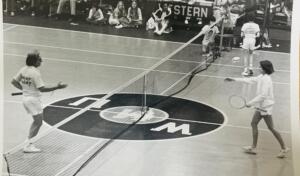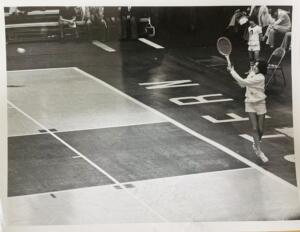NASHVILLE, Tenn. — “I’m not asking for anything special. I’m asking for equal.”
Those are the words that Thomas Hastings spoke when fighting for his daughter’s right to compete in tennis on an even playing field. In the early 1970s outside of Kalamazoo, Michigan, there was no high school women’s tennis team where Hastings’ daughter was a standout youth player.
Hastings demanded his daughter be allowed to play on the men’s squad. That daughter was Maggie Corbin, who now is married to Vanderbilt baseball head coach Tim Corbin.
“I’ve always said I’m a Title IX baby. I benefited from it, and it changed my life,” Maggie Corbin said. “It changed my life to play in college and to feel like I was an athlete as equal to a male. Then it made me act the same way that my dad did for me. It made me be the same kind of parent for my daughters and let them experience sports on a level that women should. It was an idea and a thought process handed down, and I’m grateful for that.”
Part of the Education Amendments of 1972, Title IX banned sex discrimination in schools and educational programs that receive funding from the federal government. The legislation was in its infancy and at the forefront of the changing landscape of American sports when Corbin watched her father stand up for gender equality.
And in 1973, Corbin got a once-in-a-lifetime opportunity.

Bobby Riggs and Billie Jean King were then touring the country as part of the famous Battle of the Sexes competition that pitted Riggs against King in exhibition tennis matches. The tour happened to be passing through Kalamazoo, and Corbin was asked to face Riggs in a tennis match on the campus of Western Michigan University.
“Back then I didn’t really even understand the significance of it, but now I’m like, I get it,” Corbin said of being part of that historical event. “I don’t even know who asked me to play—someone in the city arranged that. At that time, I was one of the best little tennis players in that area.”
Inside Read Fieldhouse on the campus of Western Michigan, Corbin recalled how Riggs, wearing a jacket with the words “Sugar Daddy” on it, beat her handily while playing to the crowd with a bit of showboating—as was his style. Thousands of people filled the converted basketball arena to witness the match.

“I knew that Billie Jean King and Bobby Riggs had something to do with Title IX, but I didn’t know exactly why it was set up and why it passed,” Corbin said. “It affected me on the grassroots level because I got an opportunity that I wouldn’t have normally gotten.”
Corbin would go on to play at the College of Charleston. Her daughter, Hannah Blatt, became a Commodore and competed for Vanderbilt tennis from 2006 to 2010.
And it was because of Title IX that both women had those opportunities—opportunities that began when people like Thomas Hastings pushed to enact change.
“I knew what Title IX meant because of that situation. They did allow me to play on the boys’ team, and I played on there for all four years. I do think playing on a boys team, against adversity with good coaching and good competition, got me ready to play college tennis,” Corbin said. “Had my dad not had the forethought to say, ‘My girl is going to get this advantage, she’s not just going to fade away because there’s no women’s tennis team,’ I probably wouldn’t have played college tennis.”


